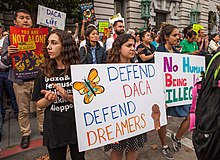 As immigration continues to be a heated topic around the world, our members work tirelessly to amplify the voices and support the rights of migrant populations. This week, after the Trump administration said it would soon end the Deferred Action for Childhood Arrivals program (DACA) – which has protected nearly 800,000 undocumented young adults from deportation – we spoke with student advocates at Historical Memory Project (HMP) at the City University of New York (CUNY). With a special focus on Latin America, HMP raises awareness of the powerful role historical memory can have in rectifying historical injustices.
As immigration continues to be a heated topic around the world, our members work tirelessly to amplify the voices and support the rights of migrant populations. This week, after the Trump administration said it would soon end the Deferred Action for Childhood Arrivals program (DACA) – which has protected nearly 800,000 undocumented young adults from deportation – we spoke with student advocates at Historical Memory Project (HMP) at the City University of New York (CUNY). With a special focus on Latin America, HMP raises awareness of the powerful role historical memory can have in rectifying historical injustices.
When President Obama started DACA in 2012, there were obvious physical benefits to children of undocumented immigrants – from the right to drive to the right to work and attend school – but what are some of the emotional benefits your organization saw in your student body at CUNY? How do you feel that might change now?
As immigrant students, we feel that rescinding DACA sends the message that you do not belong and that you can no longer be an equal amongst your peers. This creates a lack of belonging as communities are segregated, which cause feelings of rejection as young adults are forming their identity. To obtain DACA means that your humanity is being recognized and the emotional benefit is feeling that you are equal to your peers and can be an engaged citizen. To take that status away, student will not have the opportunities to follow their careers and accomplish their goals.
Can you speak to the benefits of diversity from an educational standpoint? What do we all lose if DACA is rescinded?
Diversity in the classroom brings more dynamic dialogue and creates a space of learning that acknowledges different point of views, allowing for a more realistic sense of what defines the American population. Eliminating DACA means eliminating the opportunities to an awaken communities to take action to bring about positive change for a better society. Obtaining DACA status allows youth to come out of the shadows and have a voice which might entice political change that benefits society as a whole.
From confederate monuments on college campuses to this new decision on DACA, the topic of civil rights and education is a ripe one now. Why do you think that is and how can Sites of Conscience, educational institutions and advocates best come together in support of education equity?
The recents events and political turmoil coming from the current administration has highlighted the institutionalized racism and oppression that has defined our nation since its inception. Access to education ensures a secure path to social, economic and racial equality; it provides self-fulfillment and financial security. It should be a right. Ultimately, as advocates we must bring awareness and protection to communities that are deserving and valuable members of society.
At Historical Memory Project, we feel it is imperative to find venues to reach out to immigrant communities -through schools, churches and the arts – who might be lacking the right legal information to address and confront these dire times. Now more than ever we must extend our solidarity with those most in need and for this we must go the extra mile by putting forth the time, energy and resources to provide the said information and support.
As Latinx immigrants, or children of immigrants, it is also imperative that we bring to bear our history of human rights culture and our resilience in resisting oppressive laws forced upon us. Building alliances with Sites of Conscience can enable us to reach out to a wider population through all the networks available.
